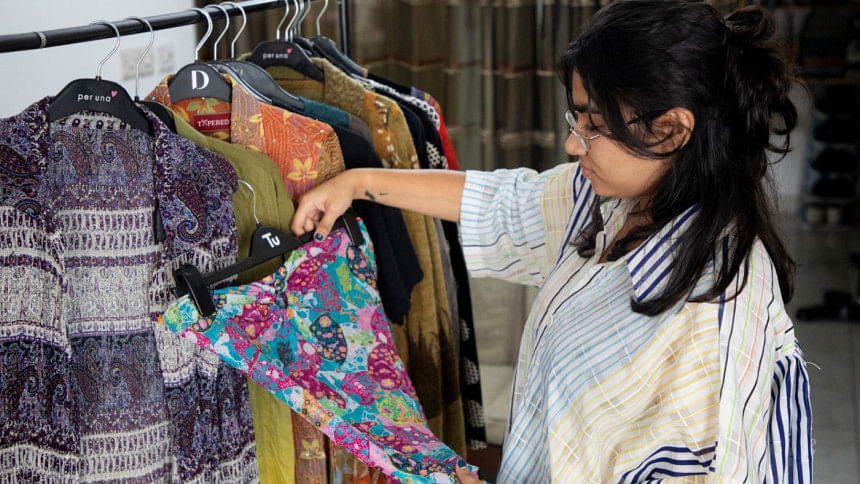The thriving online clothing thrift scene and the youth behind it

Up until the advent of the Covid-19 pandemic, the concept of thrifting, or buying old, "pre-loved" clothes, was entirely foreign to us. Then, while doom-scrolling on Instagram, we began to come across online thrift stores selling unique pieces of surprisingly good quality. We were even more taken aback to learn that most of these businesses are run by students.
These young entrepreneurs are not only proving the do-ability of running a thriving business alongside studies but also inspiring countless other students to dip their toes into the rewarding world of entrepreneurship.
For Sunayra Subha Pushpita, the founder and co-CEO of Bangladesh Thrift, starting the business was initially a matter of earning some money after O levels. However, it turned out to mean much more. "We think running an online store can be a valuable experience for students, teaching them time management, multitasking, efficient decision-making skills, and providing them with early exposure to the world of business," she says.
Something that sets thrift stores apart from mainstream retailers is that said retailers are seldom interested in catering to niche aesthetics. As online thrift stores are relatively small, owners can afford to invest in unique, out-there styles that appeal to only a small number of people, while still making worthy profit.

If a certain style of clothing is not available, chances are someone will take up the opportunity. "Back when I started in 2022, I noticed there were various thrift stores on Instagram selling Western clothes but not a single one selling traditional kameez or kurtis. There was a big gap in the market, and that's when I decided to be the first to open a thrift store for traditional clothes," said Adila Tasbi Labiba, a student at the Independent University of Bangladesh and the owner of Thrift Kameez.
Arshad Shawki and Sujana Kasfia, the co-founders of Mulberry, added, "We used to window-shop a lot, and oftentimes could not afford what we liked. Also, there was no exclusivity to the pieces created in bulk. When we started thrifting and transforming our wardrobes, people liked our sense of style. Naturally, the idea of opening a thrift store to sell these types of clothes made sense."
Many of these online thrift stores source their stocks from vintage markets overseas or domestic suppliers dealing in old and defective pieces. The circular nature of this practice lengthens the life cycle of the clothes, extending the time before they end up in a landfill.
The thrifting movement can thus be seen as a collective pushback against the impacts of fast fashion, catering to the growing environmentally conscious customer base in Bangladesh. Additionally, these clothes can be sold for a fraction of what they would cost brand-new, appealing to the younger customer base operating on a tight budget.
Adila speaks at length about her experience with juggling studies and a small business. "I started small and only dedicated time to Thrift Kameez during the weekends. Due to the huge response from my customers, I eventually started dropping in on alternate days," she shared.
She continued, "When it was getting difficult for me to manage it all on my own, my family helped me with packing and ironing the pieces." Thus, it can be observed that the work required to run an online thrift store is quite manageable if distributed amongst friends, family, or business partners. However, this depends on the scale of the sourcing and distribution operations, which is also quite versatile with a thrift store business.

It can be daunting to try to start a business as a student given the financial burden of it. However, Sunayra started Bangladesh Thrift with an investment of only 300 taka. Similarly, Adila's initial investment of 6,000 taka into Thrift Kameez came from Eidi she received from her relatives. The key to keeping the business running has been to reinvest profit back into the enterprise. Continuous reinvestment allows the business to grow, so it can, in turn, rake in enough profits for the entrepreneurs to remove a cut from it to pay themselves.
Due to online thrift stores requiring remarkably low initial investment, another young person, Ayela Amin, founder and owner of poptags and Janky, started out with Eid salami combined with 2000 taka loaned from her father, which amounted to a total initial capital of 7000 taka.
"With the 7000 taka, I bought 20 to 30 pieces, curated my collection, made my card, and designed and arranged packaging," shared Ayela.
When setting up a thrift store, challenges are frequent and complex. We say this not to downplay the financial issues that can come with running an online thrifting business, but to shed light on the relatively lower barriers to entry into these businesses.
Arshad, for instance, reflects, "Dhaka is an expensive place to live in, so saving up enough money to secure stocks in large enough quantities has been a struggle". However, the continued success of these ventures proves that it is not impossible to have a flourishing business.
Due to the sense of individuality inherent to it, the sustainability of the practice, and the affordability, the world of thrifting is not only worth experiencing as a shopper but also as an entrepreneur.
Zaima and Rishi are fresh high school graduates still reeling from A level trauma.

 For all latest news, follow The Daily Star's Google News channel.
For all latest news, follow The Daily Star's Google News channel. 








Comments